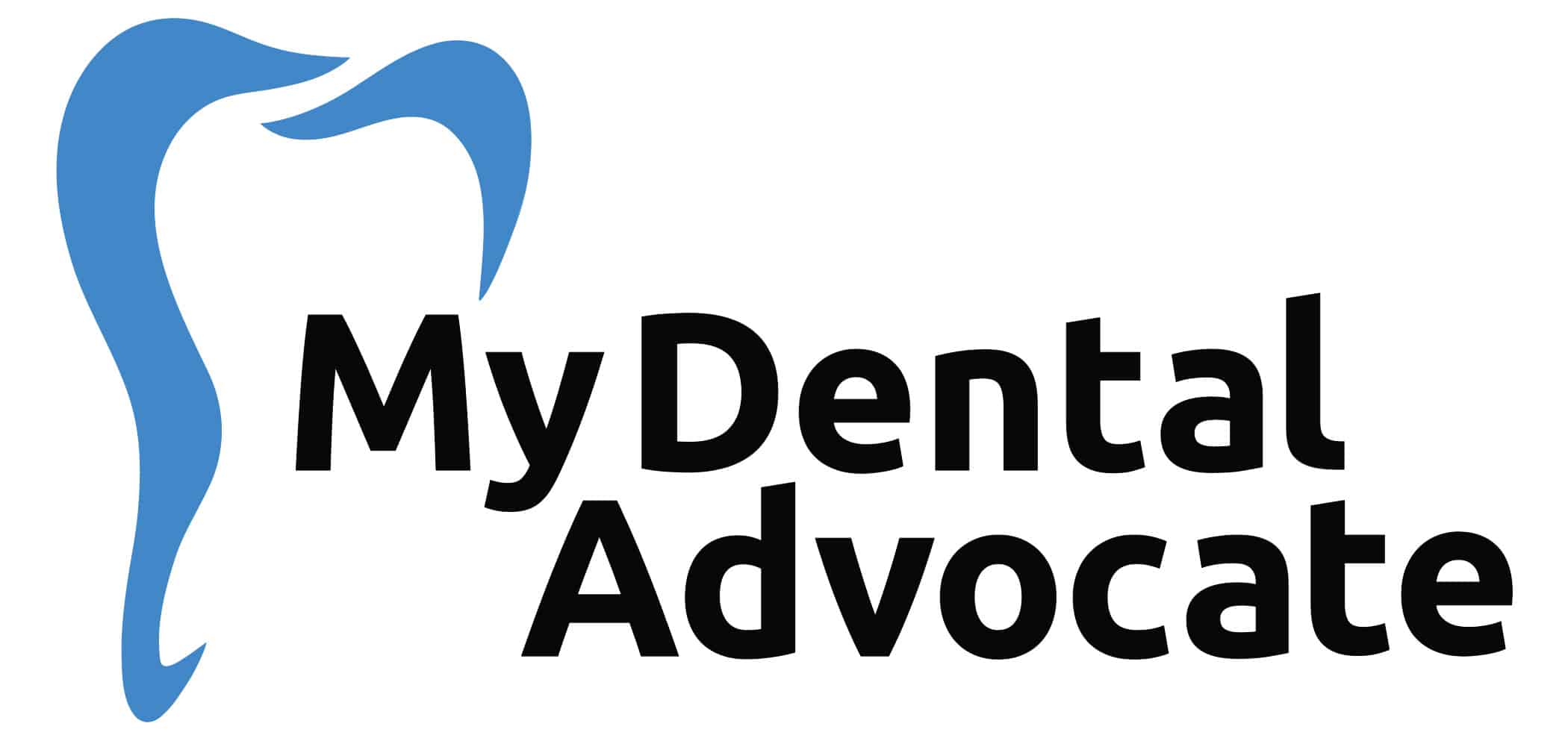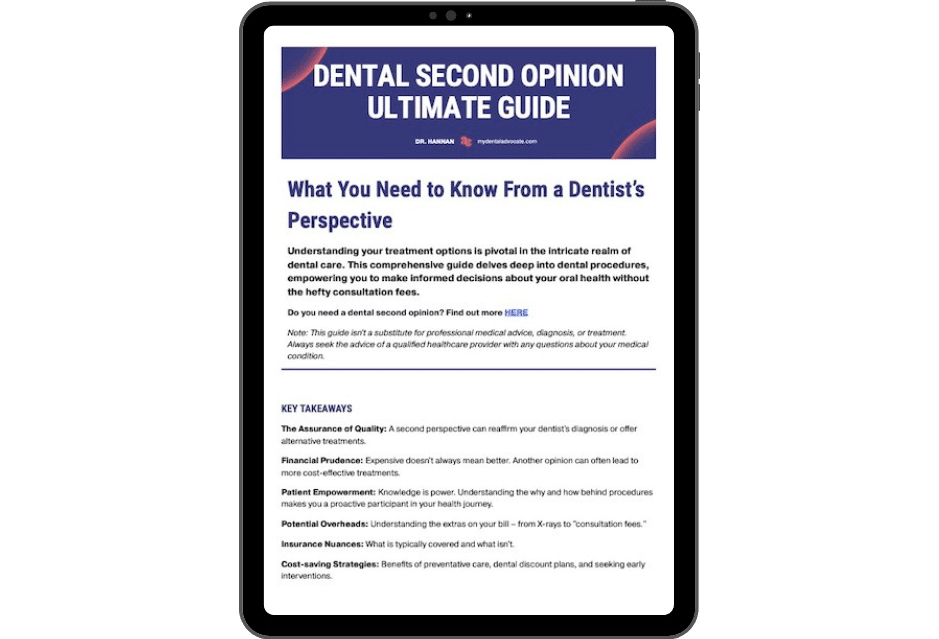6 Reasons Not to Get Dental Implants (Dentist Perspective)
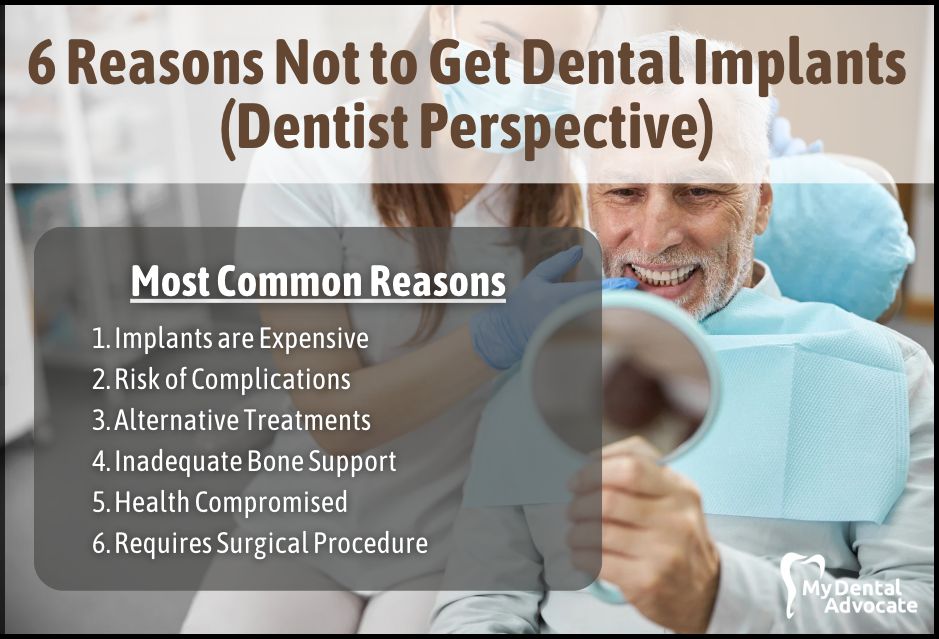
Dental implants can be a good tooth replacement solution, but they’re not suitable for everyone for several reasons.
First, they’re costly, requiring substantial investment and multiple procedures over months. Plus, not all insurance covers their costs.
Furthermore, only some are good candidates for implants. For example, missing teeth for extended periods can weaken the jawbone structure, making it inadequate for supporting an implant.
Other issues like gum disease, bruxism, certain medical disorders, and poor oral health also pose challenges.
Need Dental Advice? Ask Dr. Hannan!
Implants are Expensive
Dental implants are an ingenious solution to missing teeth. However, one of the first stumbling blocks you might encounter is the hefty price tag.
The cost can vary significantly depending on the number of implants you need and any additional procedures you might require, such as a sinus lift.
Initial Cost
The initial cost of dental implants can be relatively high, ranging from $1,850 to $3,600 for a single implant.
If you need multiple implants, the cost can quickly add up. The price will increase even further if you require other procedures, such as a sinus lift.
Remember that this cost only covers the implant itself, not the crown or abutment attached to it.
Long-term Cost
While dental implants are a long-term solution for missing teeth, they can also be costly over time. Unlike dentures or bridges, which may need to be replaced every few years, dental implants are designed to last a lifetime.
However, this also means you must pay for maintenance and potential repairs over the years.
If you have dental insurance, checking if implants are covered is essential. Unfortunately, many insurance plans do not cover the total cost of dental implants, leaving you with a significant out-of-pocket expense.
However, some plans may cover some of the cost, so it’s worth checking with your provider.
If you’re concerned about the cost of dental implants, there are some ways to make them more affordable. Some dental practices offer financing options or payment plans to help you spread the cost over time.
Additionally, you may find a dental school that offers discounted rates for implant procedures.
If you’re concerned about the cost, explore your options for financing or payment plans, and check with your insurance provider to see if implants are covered.
Recommended Reading: Throbbing Pain After Dental Implant Crown (Common Reasons)Risk of Complications
Dental implant surgery is generally considered safe, but like any surgical procedure, it carries some risks. Here are some complications you should be aware of before getting dental implants.
Infection
Infection is a potential risk after any surgical procedure; dental implant surgery is no exception. Signs of infection include fever, swelling, redness, and discharge.
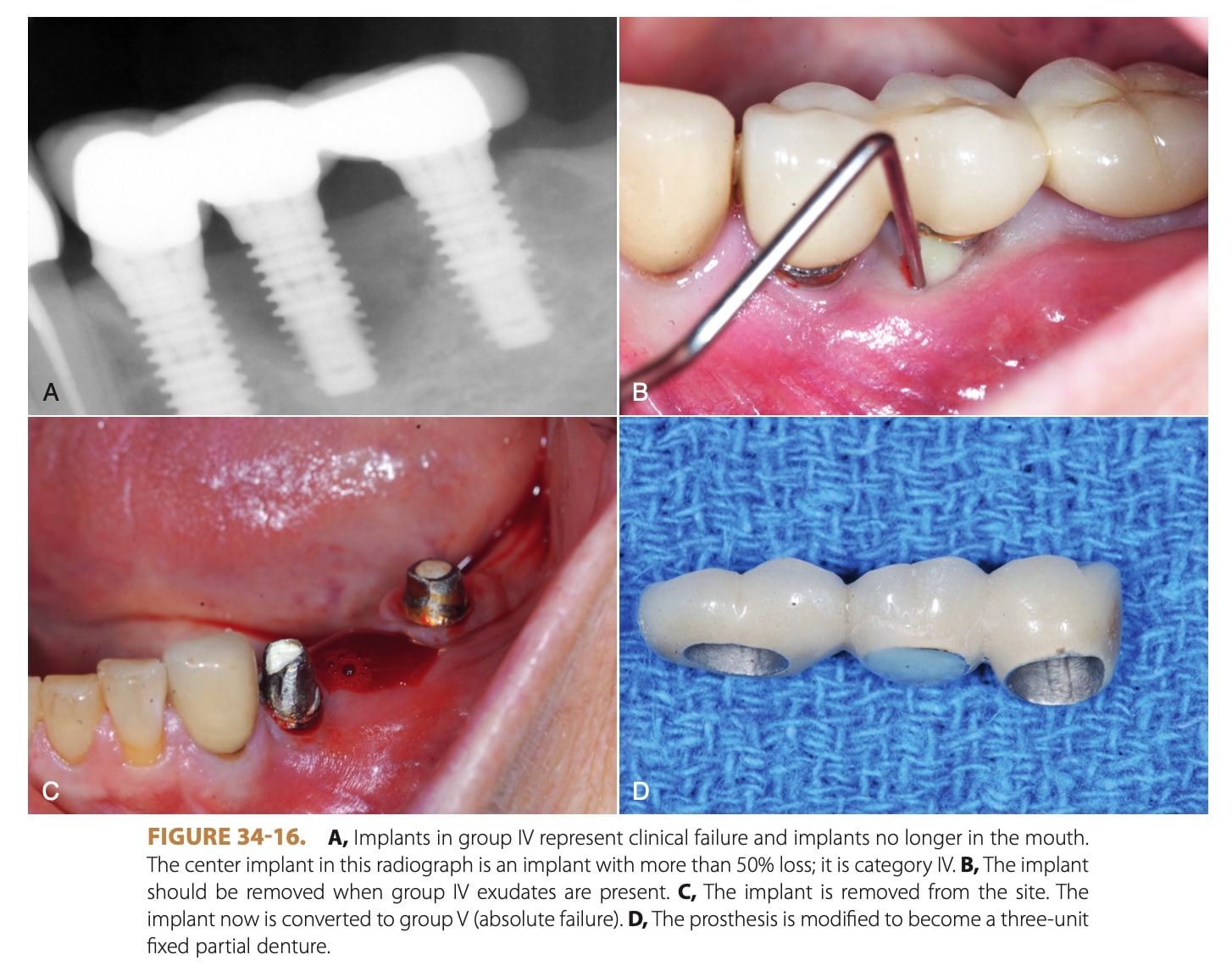
Implant Failure
Implant failure is another potential complication of dental implant surgery. It can occur if the implant does not integrate properly with the jawbone or becomes loose over time.
The risk of implant failure can be minimized by choosing an experienced dentist who uses high-quality implants and follows proper surgical techniques.
Nerve Damage
Nerve damage is a rare but severe complication of dental implant surgery. It can occur if the implant is placed too close to a nerve or if the nerve is damaged during the procedure.
Signs of nerve damage include numbness, tingling, and loss of sensation in the lips, tongue, or chin. In severe cases, nerve damage can be permanent.
Dental implant surgery is a safe and effective way to replace missing teeth. However, knowing the potential risks and complications is essential before deciding.
If you have any concerns or questions, discuss them with your dentist. In addition, you can minimize the risk of infection by following your dentist’s instructions for aftercare, such as taking antibiotics as prescribed and keeping the surgical site clean.
Recommended Reading: 7 Symptoms of Perforated Sinus After Dental ImplantAlternative Treatment Options
If dental implants are not the right choice for you, there are other alternatives that you can consider. Here are two common alternatives to dental implants:
Dental Bridges
Dental bridges are another option for replacing missing teeth.
A bridge is a dental appliance that fills the gap of one or more missing teeth. The bridge comprises two or more crowns placed on the teeth on either side of the gap, with a false tooth or teeth in between.
One advantage of dental bridges is that they are less expensive than dental implants. They are also a good option if you have healthy teeth on either side of the gap, as they can help to support those teeth and prevent them from shifting.
However, dental bridges do have some disadvantages. They require the removal of some of the healthy tooth structure from the teeth on either side of the gap.
This can weaken those teeth and make them more susceptible to decay. Bridges also have a shorter lifespan than dental implants and may need to be replaced every 5-15 years.
Dentures
Dentures are another alternative to dental implants. Dentures are removable dental appliances that replace one or more missing teeth. They can replace a few teeth or an entire arch of teeth.
One advantage of dentures is that they are less expensive than dental implants. They are also a good option if you have multiple missing teeth or significant bone loss in your jaw.
However, dentures do have some disadvantages. They can be uncomfortable to wear and may slip or move around in your mouth. They also require regular maintenance and cleaning and may need to be replaced every 5-10 years.
Inadequate Bone Support
Dental implants may not be your best option if you have inadequate bone support. The implant cannot correctly integrate with the jawbone without enough bone, leading to failure.
This can happen for various reasons, such as gum disease, injury, or tooth loss.
Bone Grafts
One solution for inadequate bone support is a bone graft. This procedure involves taking bone from another part of your body or using synthetic bone material to build up the jawbone.
Once the graft is in place, it will need time to heal and fuse with the existing bone before the dental implant can be placed. This process can take several months and may require multiple surgeries.
Sinus Lifts
A sinus lift may be necessary if you have inadequate bone support in your upper jaw. This procedure involves lifting the sinus membrane and adding bone graft material to the area between the jaw and the sinus.
This will create more space for the implant and provide the necessary support for successful integration.
It’s important to note that only some are candidates for bone grafts or sinus lifts. Your dentist must evaluate your situation and determine whether these procedures suit you.
In summary, inadequate bone support can significantly hinder successful dental implant placement. However, bone grafts and sinus lifts can provide a solution for those who need additional help.
If you are considering dental implants, discussing your options with your dentist and determining the best action for your needs is essential.
Recommended Reading: Tooth Extraction and Implant Timeline (What to Expect)Health Compromised
If you have a compromised health condition, getting dental implants may not be the best option. However, here are some factors to consider:
Good Candidates
Good dental implant candidates are those with healthy gums, enough bone density, and good oral hygiene. A compromised health condition may affect your body’s ability to heal, which could lead to implant failure.
Medical Conditions
Certain medical conditions can affect your ability to get dental implants. For example, autoimmune diseases, allergies, and diabetes can make it harder for your body to heal and increase the risk of implant failure.
In addition, people with conditions like rheumatoid arthritis and diabetes heal slowly, which can prevent an implant from fusing with the jawbone.
Smokers
Smoking can also increase the risk of implant failure.
This is because smoking can affect the blood flow to the gums, slowing the healing process. Smokers are also more likely to develop gum disease, which can lead to implant failure.
If you have a compromised health condition, you must talk to your dentist or oral surgeon about your options. They can help you determine if dental implants are a good choice.
It’s also essential to maintain good oral hygiene and follow your dentist’s instructions for aftercare to reduce the risk of complications.
Requires Surgical Procedure
Getting dental implants is a surgical procedure that involves placing a metal post into your jawbone to replace a missing tooth. While the procedure is generally safe, you should know some risks and considerations before deciding.
This section will explore the materials used, anesthesia options, and recovery time associated with dental implant surgery.
Did you know? 156-plus million Americans are missing at least one tooth.
Materials
Dental implants are typically made of titanium, a biocompatible material that can fuse with your jawbone over time. This process is called osseointegration and is essential for the long-term success of the implant.
The crown, or visible part of the tooth, is usually made of porcelain or another durable material that can withstand the forces of chewing.
Anesthesia
Depending on your needs and preferences, dental implant surgery can be performed under local or general anesthesia. Local anesthesia involves numbing the area around the implant site, while general anesthesia puts you to sleep for the duration of the procedure.
Your dentist or oral surgeon will discuss the options and help you decide which is best.
Recovery Time
After the surgery, you’ll need some time to recover before the implant can be loaded with a crown. This can take anywhere from a few weeks to several months, depending on the quality of your bone and the extent of the surgery.
During this time, you must avoid hard or crunchy foods and keep the implant site clean to prevent infection.
You may also need pain medication to manage any discomfort during recovery. Your dentist or oral surgeon will provide detailed instructions on caring for your implant and what to expect during recovery.
Disadvantages
It’s important to be aware of the potential disadvantages. So before deciding if implants are right for you, here are some things to remember.
Discomfort
Getting dental implants involves a surgical procedure, which can be uncomfortable. You may experience pain, swelling, and bruising in the days following the process. Your dentist can prescribe pain medication to help manage any discomfort.
Multiple Steps
Getting dental implants can take several months and involve multiple steps. This can be inconvenient and time-consuming, especially if you must take time off work or make numerous trips to the dentist.
Compromised Immune System
You may not be a good candidate for dental implants if you have a compromised immune system, such as from an autoimmune disease or chemotherapy.
In addition, the surgery and recovery can stress your immune system more, increasing the risk of complications.
Bruxism
If you grind or clench your teeth (a condition known as bruxism), you may not be a good candidate for dental implants. The pressure from grinding or clenching can damage the implant and surrounding teeth, leading to implant failure.
Implant Rejection, Wear and Tear
While rare, your body can reject the implant, leading to failure. Additionally, over time, the implant may wear down or become damaged, requiring replacement.
Frequently Asked Questions (FAQ)
How long does it take to complete the dental implant procedure?
The dental implant process can take several months. This is because after the implant is placed, a process called osseointegration must occur where the bone grows around the implant to secure it. This can take anywhere from a few weeks to a few months. After that, the abutment and crown are placed, which requires additional healing time.
What are the potential complications associated with dental implants?
While dental implants have a high success rate, complications can occur. These include infection at the implant site, nerve damage causing pain or numbness, sinus problems (for upper jaw implants), and the possibility of the implant failing to integrate with the bone.
What kind of maintenance do dental implants require?
Dental implants require the same care as natural teeth. This includes daily brushing and flossing, as well as regular dental check-ups. Without proper care, dental implants can develop problems like infections or implant failure.
My Experience & Expertise
Dental implants are not a one-size-fits-all solution but a highly individualized treatment plan that suits specific dental profiles.
Therefore, when weighing this option, it is crucial to consider these factors and engage in an open conversation with your dentist. Together, you can decide whether the benefits outweigh the potential challenges, keeping your oral health and personal circumstances in mind.
Need a second opinion? We can help! Learn more. Knowledge is power when cultivating healthy dental habits. The more informed you are, the better positioned you’ll be to prevent avoidable and potentially costly dental procedures for you and your family. Watch for future blog posts, where we’ll continue sharing important information, product reviews and practical advice!

About the Author
Dr. Matthew Hannan, also known as “Dr. Advocate,” is a board-certified dentist on a mission to provide accurate dental patient education. He attended Baylor University before completing dental school at UT Health San Antonio School of Dentistry. He now lives in Arizona with his beautiful wife and 4 kids. Dr. Hannan believes everyone should access easy-to-read dental resources with relevant, up-to-date dental research and insight to improve their oral health.

Connect with Dr. Hannan!
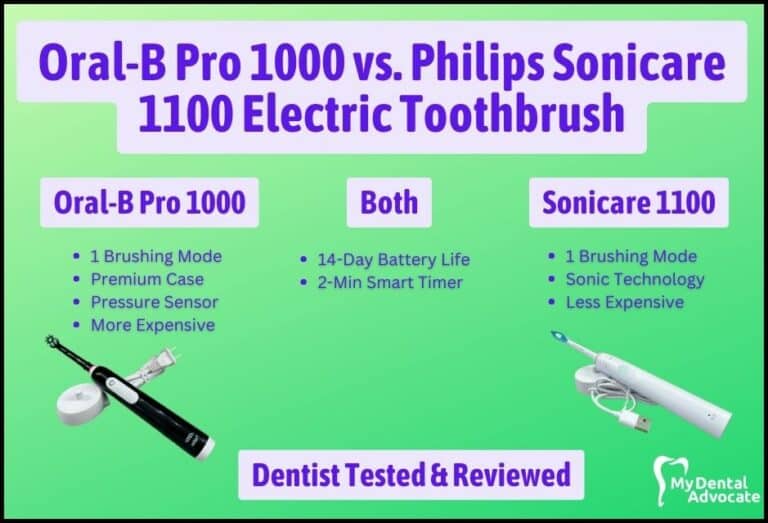
Oral-B Pro 1000 vs. Philips Sonicare 1100 Electric Toothbrush Review 2024
Seeking the best budget electric toothbrush? The Oral-B 1000 and Sonicare 1100 Electric Toothbrush are top contenders. We’ll position these two against each other, examine their features, analyze their performance, and finally, give you a solid recommendation.

3D Printing in Dentistry: Revolutionizing Crowns, Bridges, and Implants Production
3D Printing in Dentistry: Revolutionizing Crowns, Bridges, and Implants Production 3D printing provides bespoke treatment options such as dental crowns, bridges,…

Top 10 Habits for Improved Oral Health 2024
Have you ever visited the dentist anticipating an excellent report, only to question how much you floss? That would be a sinking feeling, especially if you thought you were doing a great job brushing and flossing. It may take some…
Gain Clarity with Our FREE Second Opinion Guide
Receive clear, expert second opinions online within 48 hours. Start today!
Product Reviews
Our 250+ dental product reviews (and counting), curated by an experienced dentist, are the most comprehensive online.
Toothbrush Genie
State-of-the-art chatbot designed to help you discover your perfect toothbrush in just a few simple steps!
Cavity Risk Assessment
Cutting-edge digital tool designed to evaluate your individual cavity risk based on your responses to a series of questions.
Gum Disease Assessment
Discover your gum disease risk with our quick and engaging 6-question assessment!
